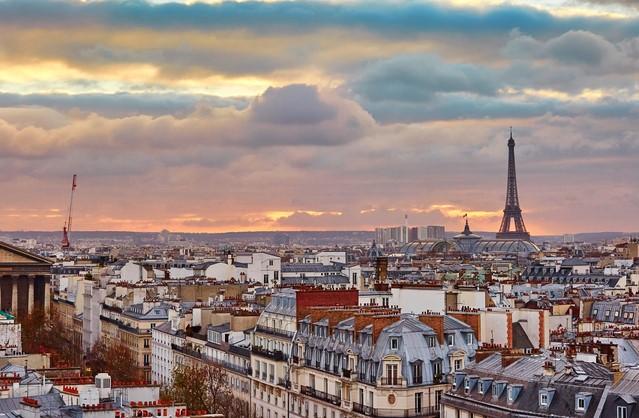France

France (French: [fʁɑ̃s] Listen), officially the French Republic (French: République française),[1] is a country primarily located in Western Europe, consisting of metropolitan France and several overseas regions and territories.[XIII] The metropolitan area of France extends from the Rhine to the Atlantic Ocean and from the Mediterranean Sea to the English Channel and the North Sea. The overseas territories include French Guiana in South America and several islands in the Atlantic, Pacific an
d Indian Oceans. France borders Belgium, Luxembourg and Germany to the northeast, Switzerland, Monaco and Italy to the east, Andorra and Spain to the south, as well as the Netherlands, Suriname and Brazil in the Americas. The country’s eighteen integral regions (five of which are situated overseas) span a combined area of 643,801 km2 (248,573 sq mi) and a total population of 67.4 million (as of March 2021).[12] France is a unitary semi-presidential republic with its capital in Paris, the country’s largest city and main cultural and commercial centre. Other major urban areas include Lyon, Marseille, Toulouse, Bordeaux, Lille and Nice. France, including its overseas territories, has the most time zones of any country, with a total of twelve.
During the Iron Age, what is now metropolitan France was inhabited by the Gauls. The area was annexed by Rome in 51 BC, developing a distinct Gallo-Roman culture that laid the foundation of the French language. The Germanic Franks arrived in 476 and formed the Kingdom of Francia, which became the heartland of the Carolingian Empire. The Treaty of Verdun of 843 partitioned the empire, with West Francia becoming the Kingdom of France in 987.
In the High Middle Ages, France was a highly decentralized feudal kingdom in which the authority of the king was barely felt. King Philip Augustus achieved remarkable success in the strengthening of royal power and the expansion of his realm, doubling its size and defeating his rivals. By the end of his reign, France had emerged as the most powerful state in Europe. In the mid-14th century, French monarchs were embroiled in a series of dynastic conflicts with their English counterparts, collectively known as the Hundred Years’ War, from which they ultimately emerged victorious. Disputes with Spain and the Holy Roman Empire soon followed during the Renaissance. Meanwhile, French culture flourished and a global colonial empire was established, which by the 20th century would become the second largest in the world.[13] The second half of the 16th century was dominated by religious civil wars between Catholics and Protestants (Huguenots), which severely weakened the country. But France once again emerged as Europe’s dominant cultural, political, and military power in the 17th
